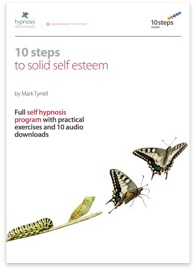Self Esteem vs Self Confidence. What's the Difference?
Insecurity, self esteem, self confidence... What does it all mean?

Most people would admit to wanting more self confidence in certain situations. And some would say they felt they felt insecure, or had low self esteem. But what do these words really mean? Are they, in fact, helpful in any way, or do they fog the issue, stopping us from thinking clearly about what's really wrong?
The most common mistake in self help
It has been shown that thinking about your performance while doing sport actually worsens it. And the same is true when it comes to self confidence, insecurity, self esteem and all these other words.
Anything which increases the focus on the self (poor self-help books for example), makes it less likely that we will be successful in developing self confidence or a good self image. In a social situation, for example, self consciousness is the opposite of what we need.
What we really need is a way out of the trap, a way of building self confidence that doesn't involve increasing our self consciousness. If you think now about the times you have really enjoyed yourself, felt particularly calm in a situation, or performed really well, I think you will find that those are times when you weren't really aware of yourself at all!
This is what we are going for: rather than holding yourself in high esteem, self acceptance can allow you to just get on with it and to enjoy doing whatever you need to do.
Self esteem and insecurity and how they relate to self confidence
Most people know what insecurity and low self esteem and feel like, but how are they different to self confidence, self belief or self love? I don't know about you, but my insecurity increases when I hear all these confusing words! This is what the Penguin Psychology Dictionary has to say about insecurity, low self esteem and other similar things...:
Self Esteem: The degree to which one values oneself
Insecurity: A lack of assurance, uncertainty, unprotectedness.
Self Confidence: Assuredness and self reliance
Self Belief: Faith in one's intrinsic competence
Self Love: Any extreme form of love of oneself (!)
Self Image: One's impression of oneself, often unconscious
So, insecurity is about uncertainty! But surely you can't escape that? Tolerating uncertainty, or insecurity is a wonderful skill to have. However, focusing on insecurity makes you feel more insecure! (Confusing isn't it?)
Does all this complication help 'low self esteem'?
There is so much 'out there' about this sort of thing, it can damage your self esteem just reading about it! Here are a few questions you can think about to help clear things up a bit...
- Do people with high self esteem value themselves all the time?
- Do 'secure' people never feel uncertain?
- Does having great self confidence mean you never rely on others?
- If you have self belief, can you never doubt yourself?
- Is 'self love' good or bad?
I think, and it's just my opinion, that the self-help movement has left us expecting unrealistic things. Of course everyone has a feeling of insecurity at times. Everyone doubts their abilities on occasion. And the key to beating low self esteem is not to go around frantically thinking great things about yourself all the time.
If you expect to feel great about yourself all the time, then you will be disappointed. If you allow for the fact that sometimes you'll feel low and just let it pass, it won't last as long and you won't feel as bad. Check out my Top Ten Facts about Low Self Esteem for some up-to-date, sensible ideas on the matter.
10 Steps to Solid Self Esteem course
Vanquish that critical inner voice and discover how much easier and happier life is with healthy levels of self esteem...







